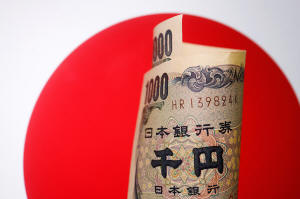Bank of Japan hints at near-term rate hike, pushing yields higher
 Send a link to a friend
Send a link to a friend
 [April 05, 2024] By
Leika Kihara [April 05, 2024] By
Leika Kihara
TOKYO (Reuters) -Bank of Japan Governor Kazuo Ueda said inflation would
likely accelerate from "summer towards autumn" as bumper pay hikes push
up prices, the Asahi newspaper reported on Friday, his strongest hint
yet that another rate hike was possible in coming months.
The rare mention of an explicit timing drove two-year Japanese bond
yields to their highest in more than a decade, helping the yen pull
further away from the 34-year-low hit last week and providing some
respite for policymakers worried about the economic effects of the
currency's weakness.
In an interview with Asahi, Ueda said the central bank could "respond
with monetary policy" if currency moves significantly drive inflation
and wages, suggesting sharp yen falls could affect the timing of the
next rate hike.
"We ended our massive stimulus program because we saw prospects for
trend inflation to approach 2% come into sight. If we become more
confident about such prospects, that will be one reason to move interest
rates," Ueda was quoted as saying.
"Sustainable and stable achievement of our 2% inflation target is coming
into sight. The possibility of achievement is expected to increasingly
heighten," he said, according to Asahi's interview that was conducted on
Wednesday.
On Friday, Japanese Finance Minister Shunichi Suzuki also waded in with
fresh currency warnings, telling reporters that authorities won't rule
out any options to deal with excessive yen falls.
The yen hit a two-week high and Japan's two-year government bond yield
rose to 0.21%, its highest in 13 years, as markets priced in the chance
of an earlier-than-expected hike in Japan's borrowing costs.

Ueda told Asahi he expected inflation to pick up "from summer towards
autumn" as wage increases begin to give households purchasing power.
The comments highlight the BOJ's conviction that rising wages and
inflation will help make the case for hiking short-term rates from the
current 0-0.1% level as soon as July.
"As priced in by markets, another rate hike by around autumn is becoming
a realistic scenario," said Naoya Hasegawa, chief bond strategist at
Okasan Securities.
"An additional rate hike in October-December is now on the cards. But
given how Ueda mentioned prospects for achieving 2% inflation will
'increasingly heighten,' there might be a chance of a hike in
July-September," analysts at SMBC Nikko Securities wrote in a research
note.
When asked whether the BOJ could raise interest rates this year, Ueda
said it was "dependent on data" and how much progress Japan makes toward
sustainably achieving the bank's 2% inflation target, according to
Asahi.
[to top of second column] |

A banknote of Japanese yen is seen in this illustration picture
taken June 15, 2022. REUTERS/Florence Lo/Illustration

The BOJ releases fresh quarterly growth and inflation forecasts at
its next meeting in April 25-26. Its board also holds rate-setting
meetings in June, July, October and December.
YEN COMPLICATES RATES
The BOJ ended eight years of negative interest rates and other
remnants of its unorthodox policy last month, making a historic
shift away from its focus on reflating growth with decades of
massive monetary stimulus.
A Reuters poll taken shortly after the March move showed more than
half of economists expecting another rate hike this year, with
October-December the most popular bet on the timing.
Data since then has been mixed with consumption and output showing
weaknesses, but the wage outlook continuing to improve.
Japanese firms agreed to raise wages 5.24% this year, the highest
increase in 33 years, according to a survey by labor umbrella Rengo
released on Thursday.
The BOJ said in a report released this week that wage hikes were
broadening to smaller firms in regional Japan, prodding firms to
pass on labor costs through price hikes.
However, the weak yen complicates the BOJ's policy path.
While declining to comment specifically on the yen's recent
declines, Ueda signaled in the interview that such moves could serve
as a reason to raise interest rates if they push up inflation via
higher import costs.
"If exchange-rate developments appear to have an impact on Japan's
wage-inflation cycle in a way that's hard to dismiss, that would be
a reason to respond with monetary policy," Ueda said.
The yen has been on a downtrend despite the BOJ's exit from
ultra-loose policy, as traders interpreted its dovish language as
signaling the next rate hike would be some time away.
A weak yen has become a source of headache for Japanese policymakers
as it inflates the cost of importing raw material and fuel, thereby
hurting households and retailers.
Adding to those headwinds, an index measuring the health of Japan's
economy published on Friday fell for the second straight months in
February, a sign growth may have peaked and is now headed for a
downtrend due to slumping factory output.
(Reporting by Leika Kihara; Editing by Diane Craft and Sam Holmes)
[© 2024 Thomson Reuters. All rights
reserved.]
This material may not be published,
broadcast, rewritten or redistributed.
Thompson Reuters is solely responsible for this content. |